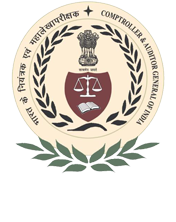Audit Reports

Sikkim
Annual Technical Inspection Report on Panchayat Raj Institutions 2007-08 & 2008-09 Sikkim
Overview
This report contains three chapters. The opening chapter contains an overview of the Panchayat Raj Institution in the State and deficiencies in the accounting procedures. Chapter 2 consists of performance audit on National Rural Employment Guarantee Scheme and Chapter 3 contains Audit paras.Despite the provisions for collection of taxes, the GPs had not initiated any steps to identify the areas for levying of taxes nor collected any revenue except Lunchok Kamery GP which had levied the above fees and taxes and realized revenue meriting appreciation.Absence of sound basis for transfer of funds to the PRIs by the departments constrained the PRIs to gauge the extent of fund availability with them in any particular year restricting them to make any plan with foreseeable certainty. The planning at the PRI level was therefore totally on ad-hoc basis Planning process duly reflecting the needs and aspiration of people at grassroots through Gram Planning Forum ( GPF ), value addition at BDOs and DDO level and final consolidation by District Planning Committee (DPC) after obtaining technical expertise from DTSC was non-functional despite formation of GPF,DPC, DTSC, etc.
Atotal of 1.13 lakh rural households registered, 0.79 lakh demanded employment and 0.75 lakh households received employment with the total fund involvement of Rs.56.53 crore during 2006-09 on execution of 1869 works.The State Government formulated rules for carrying out the provisions of the NREG Act as late as June 2006 and did not prescribe the time frame for proposing, scrutinising and approving REGS works by GP, Block and District levels as of March 2009. The State Government constituted (June 2006) State Rural Employment Guarantee Commission recording a delay of nine months and designated (October 2007) Secretary, RMDD as State Rural Employment Guarantee Commissioner after a delay of 16 months. This led to non-preparation of list of preferred works; Annual Reports for submission to the State Legislature;absence of review, monitoring and redressal mechanism; etc.
While Technical Assistants were appointed, full-time dedicated Programme Officers and dedicated Gram Rozgar Sevaks were appointed belatedly in December 2008 and panel of Accredited Engineers for assisting with the estimation and measurement of work were also not constituted nor was the Technical Resource Support Group at State / District level set up as of March 2009.While the District Perspective Plan was not prepared except by North district,annual plans were not prepared by any of the GPs indicating lack of participation or inadequate participation by Gram Sabhas and Gram Panchayats in the planning process.The Government did not prepare (i) separate District-wise Schedules of Rates specifically for NREGS works, (ii) exhaustive and detailed list of tasks required for undertaking works under REGS in different geomorphological conditions,and (iii) the productivity norms for the District Schedule of Rates for each locale in such a way that seven hours of normal work earns minimum wages on a piece rate basis. This led to uneven distribution of manpower requirement.Payment of wages to workers was delayed from one day to four months in 76 cases amounting to Rs.45.90 lakhs. Compensation for delayed payment of wages were not paid to workers.It was noticed that social audit of the scheme was not conducted during 2006-07 and 2007-08. It started only from 2008-09. Non-conduct of social audit strikes at the root of the demand-driven bottom-up approach of NREGS.
Download Audit Report
-
Preface of Report of 2007 & 2008 - Financial Audit on Panchayati Raj Institutions, Government of Sikkim
-
Overview of Report of 2007 & 2008 - Financial Audit on Panchayati Raj Institutions, Government of Sikkim
-
Chapter 1 of Report of 2007 & 2008 - Financial Audit on Panchayati Raj Institutions, Government of Sikkim
-
Chapter 2 of Report of 2007 & 2008 - Financial Audit on Panchayati Raj Institutions, Government of Sikkim
-
Chapter 3 of Report of 2007 & 2008 - Financial Audit on Panchayati Raj Institutions, Government of Sikkim
-
Appendices of Report of 2007 & 2008 - Financial Audit on Panchayati Raj Institutions, Government of Sikkim

